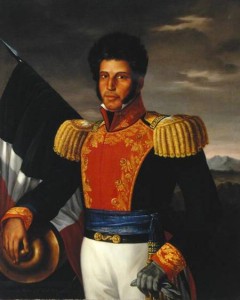Today we pay tribute to the man known as the George Washington and Abraham Lincoln of Mexico. Vicente Guerrero was one of the leading revolutionary generals in Mexico’s 11-year war of independence and, as the republic’s second president, abolished slavery in 1829 – forty years before Lincoln would do the same. But unlike his illustrious American counterparts, Guerrero was born into abject poverty, never received any formal education and was vexed by the double whammy of his African and Indian heritage. In the tyrannical caste system that Spain imposed on colonial Mexico in the early 19th century, to be either African or Indian was to be a part of an underclass denied political rights and social freedoms. But to be of mixed-race – a “pardo” or “mulatto lobo” – was, for the bigoted race-obsessed Spanish oligarchs, the absolute bottom rung of the caste ladder. It was despite and in spite of these seemingly insurmountable economic and class barriers that Guerrero rose to become a great leader. Between 1810 and 1821, he led 491 battles without defeat; at times he was the only rebel leader keeping the fight for independence alive through an ingenious guerrilla warfare campaign backed up by his loyal pardo army. Such was his egolessness and identification with his fellow indigenous soldiers that he never accepted personal credit for any of his great military victories: “It wasn’t me, but the people who fought and triumphed.”
Following Mexico’s independence, its new leaders were beset by divisions that would establish a long-running pattern of betrayed alliances, corruption and political upheavals within the fledgling country. A monarchy, its emperor and the first republican president had already been deposed when Vicente Guerrero was elected president on 1st April 1829. The “father of the people” promptly dedicated himself to improving the lot of the impoverished former castas. As president, Guerrero was an ardent defender of indigenous rights and a harsh opponent of social and economic inequalities. In reformative moves way ahead of his time, he taxed the rich, protected small businesses, abolished the death penalty and championed the village council movement in which peasants elected their own representatives. True freedom, he declared, is “living with a knowledge that no one is above anyone else, and that there is no title more honoured than that of the citizen” – and signed his correspondence “Citizen Guerrero.”
Guerrero formally abolished slavery on September 16th, 1829. But this, his greatest moment, would verily trigger his own downfall when Texas – officially Mexican territory, but largely populated by Anglo-American slaveholding settlers – immediately threatened revolt. Under immense pressure, Guerrero was forced to sign another decree exempting the future lone star state. The damage, however, had been done; in the minds of the Texan colonists and Mexico’s criollo-Spanish elite, their interests were not safe under a mixed-raced, populist president with dangerous ideas of unrestricted democracy. After just eight months in office, Guerrero was overthrown by his conservative political opponents. Forced to flee southward into the mountains, he evaded capture for a year but, in early 1831, was enticed aboard an Italian ship and betrayed by the captain, who turned him over to the government for 50,000 pesos. Guerrero was court-martialled, convicted of treason and sentenced to death. He was executed by firing squad on 14th February 1831.
And when Citizen Vicente Guerrero was killed, so too was the hope for a democratic Republic of Mexico – the way was paved for racist, elitist, self-serving and corrupt dictators who held back Mexican progress well into the 20th century. With eerie hindsight of what would befall Mexico in its next turbulent hundred years, it seems almost fantastical that a Black Indian president addressed a Republican Mexican Congress in 1829 with such judicious vision:
“The administration is obliged to procure the widest possible benefits and apply them from the palace of the rich to the wooden shack of the humble laborer. If one can succeed in spreading the guarantees of the individual, if the equality before the law destroys the efforts of power and of gold, if the highest title between us is that of citizen, if the rewards we bestow are exclusively for talent and virtue, we have a republic, and she will be conserved by the universal suffrage of a people solid, free and happy.”



Pingback: The Americas’ First Black and Native President: Vicente Guerrero | Beyond Victoriana